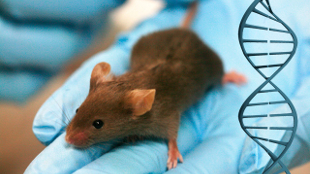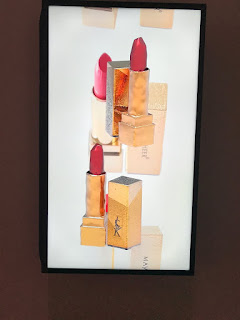Week 6: Biotech and Art
This week’s discussion is focused on biotechnology and art. It
is about experiments with animals, creating hybrids between species etc. In
recent years, there are many artists entering labs and working with live cells
and animals, which create lot of controversy. The area that interest me the
most is on animal biotechnology.
Animal biotechnology is a branch of biotechnology in which
molecular biology techniques are used to genetically engineer (i.e. modify the
genome of) animals to improve their suitability for pharmaceutical,
agricultural or industrial applications. Animal biotechnology has many
potential uses. Since the early 1980s, transgenic animals have been created
with increased growth rates, enhanced lean muscle mass, enhanced resistance to
disease or improved use of dietary phosphorous to lessen the environmental
impacts of animal manure. Transgenic poultry, swine, goats and cattle that
generate large quantities of human proteins in eggs, milk, blood or urine also
have been produced, with the goal of using these products as human
pharmaceuticals.
However, despite these advantages and potentials that transgenic
animals have presented, they also bring in lots of controversy. People are
concerned of where the experimenting of changing animal genetics would take us.
There is a video that depicted the frightening results of animal biotechnology,
called The Animal Farm. The video features an imaginary farm that consists of various
transgenic animals, looking at the side effects of genetic modification and
selective breeding. An example shown in the video is while we selectively breed
the cows to be more and more bulky to provide us with more meat, it goes too
extreme that the cows can no longer mate on their own. Human have to step in to
help them to breed, otherwise they will go extinct. There are lots of other
examples introduced in the video, which triggers the question about whether
genetic modification is ethical. Well, I
believe there is no right or wrong answer. Animal biotechnology is a double-edged
sword. It introduced massive improvement to agriculture and pharmaceutical
fields, but if human gets too greedy, it will create unpredictable side effects
on the society. I suppose while the practice gets more widespread, the society
should come out with specific law to govern the practice, to set the boundary
before it gets too far.
Reference:
1. “Introduction to Biotechnology.” PAControl. 2012. Image. Web. 7 Nov 2012.http://www.pacontrol.com/introduction-to-biotechnology.htmlLinks to an external site..
2. Kelty, Chris. “Meanings of Participation: Outlaw Biology?”. Web. 5 Nov. 2012.
3. Regulate Designer Babies. 2009. n.p. Web. 5 Nov 2012. <http://www.scientificamerican.com/media/inline/regulate-designer-babies_1.jpg>.
4. “The Need to Regulate “Designer Babies”.” Scientific American. N.p., 04 2009. Web. 5 Nov 2012. <http://www.scientificamerican.com/article.cfm?id=regulate-designer-babies>.
5. Levy, Ellen. “Defining Life: Artists Challenge Conventional Classifications.”Context Providers: Conditions of Meaning in Media Arts. Eds. Margot Lovejoy, Christiane Paul, and Victoria Vesna. University of Chicago Press: 2011



I really love your insight on GMO and GM food. Indeed, we have done too much on modifying the animals and crops. It might not be fully ethical, but I think the biggest concern is the population and starvation. For example in Africa, there are so many people starving to death daily. They have land but their land is not fertile enough to grow crops. GM food can be designed to combat such situation. So until a better method can be discovered, I think GM is still the only way to go.
ReplyDelete